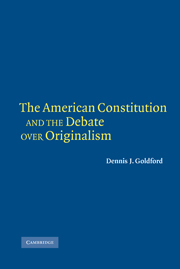Book contents
- Frontmatter
- Contents
- Preface
- Introduction
- 1 The Politics of Originalism
- 2 The Concept of a Living Constitution
- 3 Interpretivism and Originalism
- 4 The Paradox of Originalism
- 5 The Problem of Objectivity
- 6 The Epistemology of Constitutional Discourse (I)
- 7 The Epistemology of Constitutional Discourse (II)
- 8 The Ontology of Constitutional Discourse (I)
- 9 The Ontology of Constitutional Discourse (II)
- 10 Conclusion: The Political Character of Constitutional Discourse
- Index
8 - The Ontology of Constitutional Discourse (I)
Published online by Cambridge University Press: 14 May 2010
- Frontmatter
- Contents
- Preface
- Introduction
- 1 The Politics of Originalism
- 2 The Concept of a Living Constitution
- 3 Interpretivism and Originalism
- 4 The Paradox of Originalism
- 5 The Problem of Objectivity
- 6 The Epistemology of Constitutional Discourse (I)
- 7 The Epistemology of Constitutional Discourse (II)
- 8 The Ontology of Constitutional Discourse (I)
- 9 The Ontology of Constitutional Discourse (II)
- 10 Conclusion: The Political Character of Constitutional Discourse
- Index
Summary
Against the background of the extensive and highly political debates over interpretivism and noninterpretivism, or originalism and nonoriginalism, in American constitutional theory in recent years, H. Jefferson Powell published an interesting article in 1986 that draws attention to the constitutional text in an effort to establish that, in his words, “parchment matters.” The participants in those debates, he claims, have tended to dissolve the actual constitutional text into various nontextual discourses:
There are, on the one hand, those who implicitly or explicitly wish to recast American constitutional discourse into what they see as the freer and richer context of general moral debate. On the other hand, there are those who regard the text as the container for an encoded message, and the constitutionalist as a cryptographer equipped with the proper key, whether it be the “framers' intent” or the gospel of economic efficiency. Yet others, by far the largest group, do not so much undercut the text as they ignore it. For them the question of “the Constitution's” meaning is simply an inquiry into the possible implications of Supreme Court decisions.
The first group, clearly, includes those, mostly liberals, who would dissolve constitutional interpretation into general moral theory. The second group, mostly conservatives, includes those who are originalists or advocates of the law-and-economics school. The third group, descended from the legal realists, include those who dissolve constitutional interpretation into the policy preferences of individual justices.
- Type
- Chapter
- Information
- The American Constitution and the Debate over Originalism , pp. 235 - 262Publisher: Cambridge University PressPrint publication year: 2005



